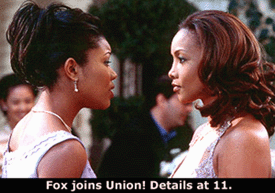*½/****
starring Vivica A. Fox, Morris Chestnut, Anthony Anderson, Gabrielle Union
written and directed by Mark Brown
 by Walter Chaw I suspect that the preponderance of advertising executive characters in romantic films nowadays (What Women Want, Sweet November) is a misguided attempt to justify excessive product placement. There can be no other explanation for the blatant shilling of Coca-Cola and Miller Genuine Draft in Mark Brown’s smarmy, derivative Two Can Play That Game, a film not otherwise about soft drinks and cheap American beer that is festooned with more conspicuous logos than a NASCAR driver. The impression that the movie is little more than a naughty-talking, 90-minute commercial for cool refreshments and prehistoric gender stereotypes is enhanced by characters who keep breaking the fourth wall to address the camera directly.
by Walter Chaw I suspect that the preponderance of advertising executive characters in romantic films nowadays (What Women Want, Sweet November) is a misguided attempt to justify excessive product placement. There can be no other explanation for the blatant shilling of Coca-Cola and Miller Genuine Draft in Mark Brown’s smarmy, derivative Two Can Play That Game, a film not otherwise about soft drinks and cheap American beer that is festooned with more conspicuous logos than a NASCAR driver. The impression that the movie is little more than a naughty-talking, 90-minute commercial for cool refreshments and prehistoric gender stereotypes is enhanced by characters who keep breaking the fourth wall to address the camera directly.
Gorgeous ad exec Shante Smith (Vivica A. Fox) appears to be striking a blow for African-American women in the workplace: she makes tons of cash, drives an $80,000 car, and lives in a mansion. “Appears to be,” because Conny (Gabrielle Union), her peer at a rival company, is revealed to have gained a similar position from sleeping her way up the corporate ladder. The problem is twofold with this scenario: Smith’s dignity is torpedoed by the easy bashing of another woman in an identical situation, and the film’s dignity is torpedoed by the perceived need for a villain in a romantic comedy. Further aspirations towards sensitivity and respectability are flummoxed by cheap jokes at the expense of a lisping queen burlesque receptionist and a mincing Chinese delivery boy (“Ahh, nex doah? So solly!”)–to say nothing of the attendant John Gray, men are from Mars, women are from Venus pop-sociology malarkey that makes atrocities like The Rules, Oprah’s Book Club, and Deepak Chopra possible.
The second of the titular “two” playing “that game,” Morris Chestnut plays buff hotshot lawyer Keith, Shante’s “man,” who is caught one night dancing with a female co-worker. Infuriated, Shante confides snarkily to viewers that she’s about to institute her “10-Day Plan” to first punish, then torture, and finally snare her man for good. Title cards (“Day One,” “Day Two,” and so forth), accompanied by a twee revving engine noise, jauntily announce the installation of Shante’s Machiavellian clockwork machinations, and the usual parade of Waiting to Exhale sidekicks (and hyphenate Brown’s own Def Jam’s How to be a Player collaborators) trundle in to offer facile comic interludes and relational counterpoints.
Two Can Play That Game is essentially Emma transplanted to a modern urban setting: Like any Jane Austen or Austen knock-off, it’s free of tension or surprise. The film also features a main character so manipulative and arch (especially with her friends, inexplicable kowtowers to the feet of this disagreeable and patronizing woman) that the monologues Shante delivers to the audience actually distance us from her plight rather than draw us in. It’s extremely hard to fall in line with a film whose protagonist suggests Iago sans a trace of irony.
Chestnut is an agreeable and virile male lead who still hasn’t had a better role than that of doomed Ricky in John Singleton’s Boyz N the Hood, and in the part of his Polonius-like best friend/advisor, portly comic Anthony Anderson (Me, Myself & Irene) shines. Although Anderson is underused (and misused), he fares considerably better than Shante’s trio of fawning, wailing constructs, which of course include the fat, promiscuous one, the one dating a reclamation project, and the one seeing a cheating dog. Brief, wholly superfluous vignettes detailing just how reprehensible men are comprise the film’s introductory scenes; I wonder how Two Can Play That Game would be received were the gender roles reversed and the comedy derived from a misogynistic place rather than the more socially acceptable sport of male-bashing.
Two Can Play That Game is a female revenge fantasy that plays on comfortable pigeonholes, rests on hoary old romantic-comedy conventions, and boasts of more blue street patois than an episode of Def Comedy Jam. A brief cameo by a funked-out, snaggle-toothed Bobby Brown is mildly amusing, but the performance’s unctuous self-deprecation comes off as too rehearsed, too convinced of its own cleverness, and, ultimately, too much like the movie in which it finds itself. Two Can Play That Game is essentially a clunky redux of Boomerang, and that’s no kind of endorsement.



